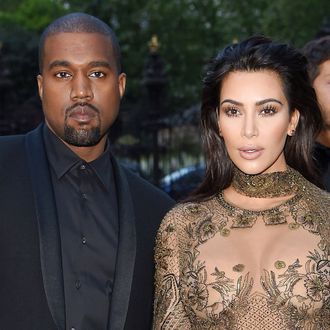
Sunday night saw the entertainment industry embroiled in a great and terrible civil war, as Kim Kardashian made good on her threat to release the audio of Taylor Swift approving a T. Swift reference in Kanye West’s “Famous.” (As Swift pointed out, said audio didn’t show her approving the line calling her “that bitch.”) Now all of Calabasas is taking sides. But if you’re an adult who feels bad about paying so much attention to a petty celebrity feud, don’t worry, there’s also a legal angle: Did Kim break the law in recording audio of Taylor without her consent?
Interestingly, it depends on the state. In most states, recording a phone call is legal as long as one party in the conversation consents to the recording. However, some states — California, Connecticut, Florida, Hawaii, Illinois, Maryland, Massachusetts, Montana, New Hampshire, Pennsylvania, and Washington — have passed laws saying you can only record calls if every person on the line is aware of and consents to the recording. (Hawaii’s law only applies if the recording is made in private, while Illinois’s was ruled unconstitutional in 2014.)
The precedent is murky about which law applies during interstate phone calls, which just makes the legal situation even more vague: It’s unclear whether Kim and Kanye were in New York (a one-party state) or California (a two-party state), or if Taylor was in Tennessee (a one-party state)*, or if everyone was somewhere else entirely. (On the call, Kanye does reference Swift’s “Nashville number,” but they could be talking about a cell phone area code.) In Swift’s statement to GQ, however, she says she was “on vacation with her family” during the call; a perusal of Swift’s Instagram does not offer any immediate clues to where this vacation was, but you’re welcome to scour it yourself. The Kardashian family’s legal winning streak is counting on you.
Update, July 19: TMZ reported Monday that Swift threatened to sue over the audio under California’s two-party consent law. (An anonymous source claims West and Kardashian were in Los Angeles when they made the recording.) This squares with Kim’s earlier assertion in GQ that Swift’s lawyer sent Kim and Kanye a letter demanding they destroy the footage. Fittingly, Sunday night’s episode of Keeping Up With the Kardashians demonstrated that Kim has a thorough knowledge of the complexities of state recording laws, and it now appears she’s in the clear. California’s two-party consent law only applies to “confidential communication,” and on Tuesday, TMZ, having heard the full recording, reported that Swift was aware multiple people were listening in on the conversation. The call thus fails the “confidential” standard, making the recording legal. Kardashians win again!
*We have clarified that the locations of all parties in the call are unconfirmed.


